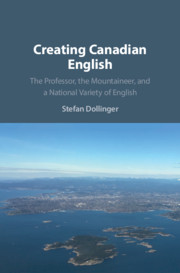Book contents
- Creating Canadian English
- Frontispiece
- Creating Canadian English
- Copyright page
- Dedication
- Contents
- Figures
- Tables
- Preface
- Acknowledgements
- A Note to the International Reader
- 1 What is Canadian English?
- 2 The Heritage of Canadian English
- 3 Avis Pulls It Off
- 4 The “Technology”: Slips, Slips, and More Slips
- 5 1967 – Excitement and Hype
- 6 Riding the Wave of Success
- 7 A Global Village and a National Dictionary War
- 8 Decolonizing DCHP-1 and DCHP-2
- 9 Is There Really a Canadian English?
- Notes
- Further Reading
- Bibliography
- General Index
9 - Is There Really a Canadian English?
Published online by Cambridge University Press: 24 June 2019
- Creating Canadian English
- Frontispiece
- Creating Canadian English
- Copyright page
- Dedication
- Contents
- Figures
- Tables
- Preface
- Acknowledgements
- A Note to the International Reader
- 1 What is Canadian English?
- 2 The Heritage of Canadian English
- 3 Avis Pulls It Off
- 4 The “Technology”: Slips, Slips, and More Slips
- 5 1967 – Excitement and Hype
- 6 Riding the Wave of Success
- 7 A Global Village and a National Dictionary War
- 8 Decolonizing DCHP-1 and DCHP-2
- 9 Is There Really a Canadian English?
- Notes
- Further Reading
- Bibliography
- General Index
Summary
The final chapter goes beyond the set time frame of 1940-98 and into the present. Analyzing news coverage since the postwar period, in this chapter we identify a recurring Canadian news coverage on Canadian English, presenting the concept of "Canadian English" as either new or weird. In the light of the evidence presented throughout the book, the readers are in the position to decide for themselves whether there is a Canadian English. Canadian intellectuals are shownas often taking a rather negative stance, treating expressions of national identity as more or less akin to national jingoism, which is surprising given their generally international orientation. Attitude data are used to show that a "Canadian way of speaking" is firmly entrenched in the minds of today's Canadian residents, with 80 per cent of Canadians across all age groups positively confirming the concept. This is a radical change from only a generation or two ago, when especially younger Canadians were often sceptical. News coverage has since also seen a shift, being today exclusively positive. Such data should encourage educators to teach about Canadian English expressly, starting in elementary school. Using examples from www.dchp.ca/dchp2, it is shown that much remains to be explored about Canadian English.
Keywords
- Type
- Chapter
- Information
- Creating Canadian EnglishThe Professor, the Mountaineer, and a National Variety of English, pp. 218 - 244Publisher: Cambridge University PressPrint publication year: 2019

